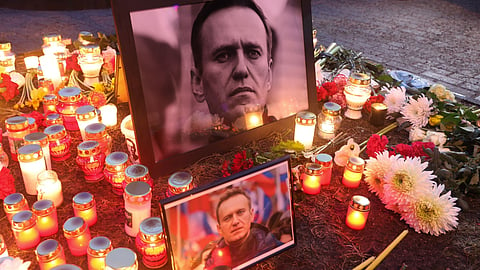Bloomberg editorial: Alexey Navalny’s legacy – A fearless defender of democracy
In a world increasingly gripped by authoritarianism, the life and courage of Alexey Navalny stand as a beacon of resistance. For over a decade, he fearlessly opposed Putin's regime, surviving attacks and imprisonment. Navalny's strategic brilliance exposed corruption, rallied millions, and transcended political lines. His recent death, attributed to the Russian government, underscores the sacrifices made for a democratic Russia. As his wife vows to continue his mission, Navalny's call to defy fear and fight for a better future reverberates globally.
Sign up for your early morning brew of the BizNews Insider to keep you up to speed with the content that matters. The newsletter will land in your inbox at 5:30am weekdays. Register here.
By The Editors
Don't be afraid. If people take one lesson from the life of Alexey Navalny, let that be it. The courage he demonstrated will be required in abundance to carry on the mission for which he made the ultimate sacrifice.
For more than a decade, Navalny occupied one of the most dangerous jobs on the planet: leading the opposition to Russian President Vladimir Putin's increasingly despotic regime. The fact that he survived as long as he did is a testament to how well he filled the role. With bravery, wit and sophistication, he became such a conspicuous irritant that he couldn't quietly be eliminated.
A lawyer by education, Navalny never tired of devising ways to expose the regime. He used shareholder-rights laws to reveal how state-controlled companies misappropriated hundreds of millions of dollars. He crowdsourced investigations into government procurement practices. He garnered millions of views with YouTube videos connecting Putin's inner circle to a long list of assets, including a Greek spa hotel, luxury yachts and an opulent palace on the Black Sea coast. He turned local elections against the ruling party by exhorting Russians to vote for whichever candidate could defeat it, regardless of qualification or politics.
Efforts to intimidate Navalny invariably backfired, further raising his profile. In 2013, after a Russian court sentenced him to five years in prison on specious charges, thousands of supporters took to the streets and secured his release, setting him on course for a strong performance in that year's Moscow mayoral election. After an unknown attacker splashed green industrial dye on his face in 2017, green became the unofficial color of the opposition. Navalny's poisoning with the nerve agent Novichok almost killed him in 2020, but it also made him an international celebrity and — with the help of the investigative outfit Bellingcat — resulted in the unmasking of the Kremlin-linked perpetrators.
Through it all, Navalny unfailingly projected optimism: that Russia could be different, that he could inspire enough fearlessness in the people to topple Putin. To that end, he was willing to reach beyond the liberal opposition, including flirting with nationalists. He was willing to endure the pain of seeing his parents' business raided and his brother Oleg imprisoned. He was willing to return to Russia after his poisoning, knowing that he would almost certainly be arrested, or worse.
Navalny, 47, died in a remote penal colony near the Arctic Circle after three years incarcerated in harsh conditions that included long periods in solitary confinement, and after disappearing for weeks into Russia's notoriously dangerous prison-transfer system. Make no mistake: The Russian government, and by extension Putin, bears full responsibility for his death. The timing is also notable, coming just as Putin is preparing for the March presidential election.
It's hard to imagine who could replace Navalny. Russians have been detained for so much as laying flowers in his memory. Nonetheless, his wife, Yulia, has vowed to continue his work. In one of his last public statements, he urged people to crowd polling stations at noon during the March election — an artful way to register opposition to Putin and the war in Ukraine, given that authorities would struggle to distinguish protesters from citizens fulfilling their responsibility to vote.
To the very end, some Russians harbored doubts about Navalny. If he really was such a thorn in Putin's side, they reasoned, how could he still be alive? Perhaps now they'll believe he was sincere. "Don't be afraid," he said in 2021, upon arriving to immediate arrest in Russia. "Take to the streets. Don't do it for me, do it for yourselves and your future." In a world where authoritarianism is on the rise, it's a message that should resonate far beyond Moscow.
Read also:
© 2024 Bloomberg L.P.

